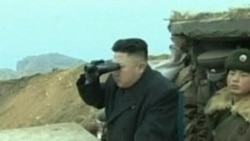STATE DEPARTMENT —
With an increasingly belligerent North Korea threatening hostilities against the U.S. and South Korea, the Obama administration is looking to China to help resolve the standoff over North Korea's nuclear program.
With North Korean leader Kim Jong-Un threatening a pre-emptive nuclear strike to stop what Pyongyang says are plans for a U.S. and South Korean attack, Washington is again calling on Beijing to help check North Korean hostility.
"We believe that no country, including China, should conduct “business as usual” with a North Korea that threatens its neighbors. China’s interest in stability on the Korean Peninsula argues for a clear path to ending North Korea’s nuclear program," said U.S. National Security Advisor Tom Donilon:
Though China has backed last week's new U.N. sanctions against North Korea, Chinese Foreign Minister Yang Jiechi says that is not the "fundamental way" to resolve the crisis.
"The only right way to resolve the issue is to take a holistic approach and resolve the concerns of all parties involved in a comprehensive and balanced manner through dialogue," Jiechi said.
And despite China's support for the sanctions, Cato Institute analyst Justin Logan says the international community is giving Beijing little incentive for tougher action.
"There has been very, very little offered I think to China to take what it views as an ambitious and risky step by really turning the screws on North Korea," Logan said.
Logan says reducing the U.S. military presence in South Korea could help ease Chinese concerns.
"They're very, very concerned about the prospect of a unified Korea with American military garrisons on their border. That is a military problem that the Chinese think is important," Logan said.
But North Korea's military poses its own problems for China, says American University professor Pek Koon Heng.
"China needs to deal with North Korea and needs to disengage from North Korea in a way that is more meaningful because otherwise North Korea will become a threat to China as well," Heng said.
Heng says an increasingly unpredictable North Korea is pushing China closer to the United States, despite differences over other issues, such as the South China Sea.
"We're seeing maybe the Chinese decoupling the North Korean engagement with the problems of the South China Sea because they see that their national interest, they see their own security at risk with North Korea doing what it has been doing," Heng said.
U.S. officials say they will not stand by while North Korea seeks to develop a nuclear-armed missile that can target the United States. Instead, the Obama administration says it is encouraging North Korean leaders to choose a better path to help develop their economy and feed their people if they honor their promises and respect international law.
With North Korean leader Kim Jong-Un threatening a pre-emptive nuclear strike to stop what Pyongyang says are plans for a U.S. and South Korean attack, Washington is again calling on Beijing to help check North Korean hostility.
"We believe that no country, including China, should conduct “business as usual” with a North Korea that threatens its neighbors. China’s interest in stability on the Korean Peninsula argues for a clear path to ending North Korea’s nuclear program," said U.S. National Security Advisor Tom Donilon:
Though China has backed last week's new U.N. sanctions against North Korea, Chinese Foreign Minister Yang Jiechi says that is not the "fundamental way" to resolve the crisis.
"The only right way to resolve the issue is to take a holistic approach and resolve the concerns of all parties involved in a comprehensive and balanced manner through dialogue," Jiechi said.
And despite China's support for the sanctions, Cato Institute analyst Justin Logan says the international community is giving Beijing little incentive for tougher action.
"There has been very, very little offered I think to China to take what it views as an ambitious and risky step by really turning the screws on North Korea," Logan said.
Logan says reducing the U.S. military presence in South Korea could help ease Chinese concerns.
"They're very, very concerned about the prospect of a unified Korea with American military garrisons on their border. That is a military problem that the Chinese think is important," Logan said.
But North Korea's military poses its own problems for China, says American University professor Pek Koon Heng.
"China needs to deal with North Korea and needs to disengage from North Korea in a way that is more meaningful because otherwise North Korea will become a threat to China as well," Heng said.
Heng says an increasingly unpredictable North Korea is pushing China closer to the United States, despite differences over other issues, such as the South China Sea.
"We're seeing maybe the Chinese decoupling the North Korean engagement with the problems of the South China Sea because they see that their national interest, they see their own security at risk with North Korea doing what it has been doing," Heng said.
U.S. officials say they will not stand by while North Korea seeks to develop a nuclear-armed missile that can target the United States. Instead, the Obama administration says it is encouraging North Korean leaders to choose a better path to help develop their economy and feed their people if they honor their promises and respect international law.





